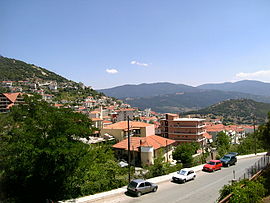Karpenissi
|
Karpenisi Καρπενήσι |
|
|---|---|

View of Karpenisi
|
|
| Coordinates: 38°55′N 21°47′E / 38.917°N 21.783°ECoordinates: 38°55′N 21°47′E / 38.917°N 21.783°E | |
| Country | Greece |
| Administrative region | Central Greece |
| Regional unit | Evrytania |
| Government | |
| • Mayor | Nikos Souliotis |
| Area | |
| • Municipality | 948.6 km2 (366.3 sq mi) |
| • Municipal unit | 250.9 km2 (96.9 sq mi) |
| Elevation | 960 m (3,150 ft) |
| Population (2011) | |
| • Municipality | 13,105 |
| • Municipality density | 14/km2 (36/sq mi) |
| • Municipal unit | 8,575 |
| • Municipal unit density | 34/km2 (89/sq mi) |
| Community | |
| • Population | 7,348 (2011) |
| Time zone | EET (UTC+2) |
| • Summer (DST) | EEST (UTC+3) |
| Postal code | 361 00 |
| Area code(s) | 22370 |
| Vehicle registration | ΚΗ |
| Website | www.karpenissi.gr |
Karpenisi (Greek: Καρπενήσι) is a town in central Greece. It is the capital of the regional unit of Evrytania. Karpenisi is situated in the valley of the river Karpenisiotis (Καρπενησιώτης), a tributary of the Megdovas, in the southern part of the Pindus Mountains. Mount Tymfristos (2,315 m elevation) lies directly to the north of the town, and the foothills of mount Kaliakouda are in the south. Karpenisi has a ski resort and is a popular destination, especially during winter. It is called Switzerland of Greece for the resemblance with the mountainous country and its beauty, atypical for a Mediterranean place.
According to Homer, the first known inhabitants of northern Evrytania were the Dolopes, who took part in the campaign against Troy around 1100 BC. The ancient capital of the area was Oechalia, situated close to the city of Karpenisi. Ancient Evrytanians especially honored Artemis, the goddess of hunting and Odysseus for his ability to be cunning and inventive. There are two possible explanations for the origin of the name "Evrytania". The first is that is formed from the Greek word "ev" for "well" and the verb "chreo", for "flow" so that altogether the word "Evrytania" means the place where there is plenty of fresh and "well flown" water. The second explanation for the names origins, comes from the verb "evryo", meaning "stretching the cord of the bow", hence the name of the first king of the area, Evrytos, who was an excellent archer.
In the Roman period, the area became better known, especially after the battle between the Roman and the Aetolian League (Greek) armies, in the location of "Kokalia", which ended in favour of the former. During the Byzantine times, the people of Evritania had the rare privileges of self-government and tax exemption. For this reason the northern part of the district was also called "Agrafa" (unwritten), because the residents were not listed in the Imperial tax registers.
...
Wikipedia


